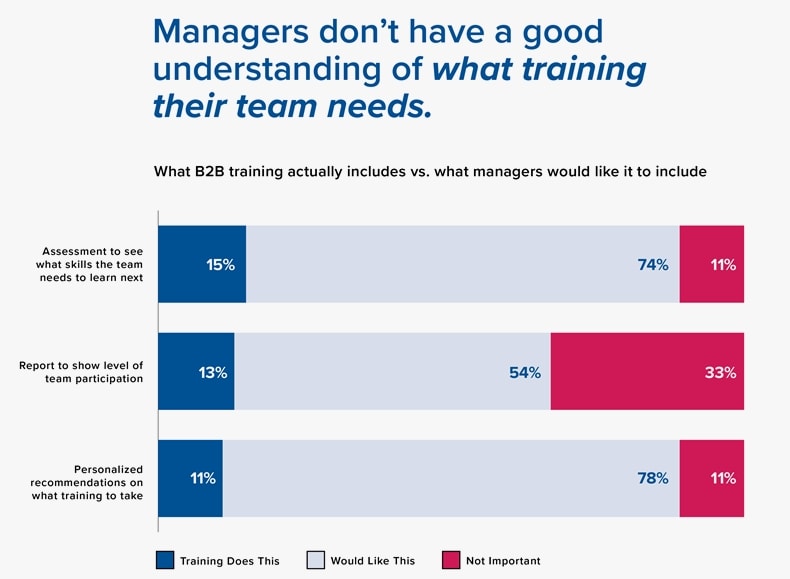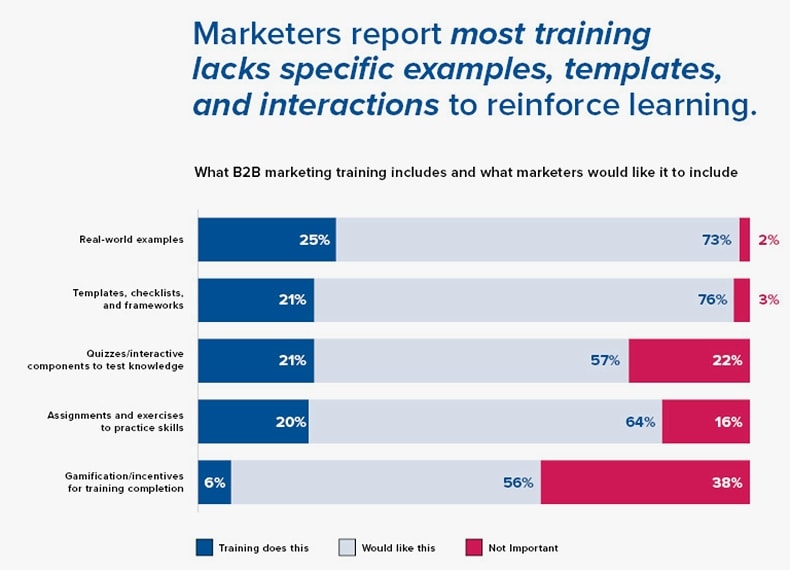"The average organization spent $2,020 per salesperson on sales training in the last full fiscal or calendar year, not including expenses for an annual sales kickoff meeting. Seven in 10 organizations intended to maintain or increase that spending in the current fiscal or calendar year, and eight in 10 intended to do so for the next one." —Highspot/ATD 2021 State of Sales Training Report
As organizations prioritize go-to-market (GTM) models that align sales and marketing teams, in part through sales training, MarketingProfs asked, "What about B2B marketing training?"
We couldn't find an answer. So, we decided to do our own research.
What Is a Go-to-Market Strategy?
Go-to-market, the buzzword du jour, describes a strategy that the best B2B organizations have been implementing for some time. In such a strategy, sales and marketing organizations are aligned around their customers and markets.
Specifically, those organizations...
- Understand their market and their position in it
- Segment their markets
- Understand the customers in each segment
- Understand where they sit vs. the competition
Only then do they create an aligned activation plan for Marketing and Sales.
And that approach is incredibly profitable: "When Sales and Marketing align, your company optimizes their marketing and sales cycles as a whole, resulting in reduced costs and an increase in growth. Sales and Marketing alignment can lead to a 32% increase in year-over-year (YoY) revenue growth," according to the Aberdeen Group.
But organizations have been so focused on Sales, they've forgotten their marketers.
We can fix that.
The State of B2B Marketing Training Report Findings
B2B organizations are missing the opportunity to super-charge their GTM engines. Some highlights (or lowlights?) from our survey of B2B marketers:
- Only 19% say they feel very prepared for their future in marketing.
- Only 31% say they feel their team is very effective in their roles.
- A full quarter don't think everyone on their team has a basic understanding of marketing.
- A third say they feel burned out.
- Two-thirds are seeking new job opportunities.
Those results, although sad, are not surprising. (OK, maybe they're a little surprising.) We already know that CMOs have the lowest tenure in the C-Suite. We also know that Marketing turnover is high compared with other departments'.
As we dive into the research further, it becomes clear that...
- Managers don't know what skills their team needs to learn. Only 15% of marketing managers report that their training includes an assessment to see which skills their team needs to learn next. An additional 74% would like their training to include assessments, and 78% would like personalized recommendations on what training to take.
- Few organizations are proactive about B2B marketing training. Most B2B organizations do not have a process to decide what training is needed (only 13% have one in place). Although that ad hoc approach isn't ideal, what's more problematic is that 50% of non-managers say they're unsure whether their organization has a budget at all for B2B marketing training.
- Marketers struggle with B2B marketing training because it's too focused on theory. The biggest frustration marketers have with B2B marketing training is its focus on theory. Half of marketers are frustrated because they want more training focused squarely on execution. More than 70% of marketers want training to include real-world examples, templates, checklists, frameworks, etc.
- The gap between the type of training marketers are using and the type they want to use is wide. Self-paced online courses are used frequently for training, and most marketers say self-paced training is effective for them. Yet, companies often rely on virtual events for additional training, whereas marketers prefer workshops and in-person conferences.
But marketing leaders are trying. Some 70% of organizations report that their teams participated in B2B marketing training, but only 30% say their current training is helping them meet their business goals.
So, what's wrong with our approach?
Download the full B2B marketing training report here.
Marketing Leaders Don't Have a Good Understanding of What Training Their Team Needs
Only 15% of marketing leaders have assessment tools (75% would like them). Only 13% have reporting in place to see team participation (54% would like reporting). And only 11% have personalized recommendations on what training their teams should take (a whopping 78% would like that, too).

Individual team members feel the same way: 70% report that their training is not helping them meet their business goals (but they would like it to).

The Good News: There's a Right Way to Create a Prepared and Effective Marketing Team
Our study revealed specific (and varying) things that organizations provide to those 19% of B2B marketers who say they're prepared for their future in marketing.
Compared with "not prepared" and "somewhat prepared":
- "Very prepared" marketers' organizations provide a formal process to assess what skills their marketing team needs to learn. Ongoing learning is a part of their company culture. And the organization (and the marketer) can measure the impact of the training.
- "Very prepared" marketers' training helps them meet business goals. In other words, they understand their purpose and have support to get there.
- "Very prepared" marketers have access to assessments, self-paced training, real-world examples, assignments and exercises, templates, checklists, frameworks, personalized recommendations, and gamification that help them meet their goals.
Why All This Matters: The Great Resignation
Marketing has always had high turnover. And turnover creates chaos, lowers productivity, and costs organizations money.
What the media is calling "The Great Resignation" is making things only worse.
Our report found that a full two-thirds of B2B marketers are seeking new job opportunities. However, the "very prepared" marketer is less likely to be looking for a new job.
In fact, marketers who consider themselves "very prepared" for a future in marketing are more likely to...
- Have documented and tracked goals
- Feel very effective and connected to their team
- Be energized about their job
- Think marketing is "very respected" and that it is "very easy" for the team to solve problems or tackle projects together
So, What Can Marketing Leaders Do Immediately?
- Document your business goals. You need to know where you're going and what success looks like for your organization. Without those guideposts, the rest of these steps won't make as much of an impact.
- Make ongoing learning part of your company culture. Start by setting learning goals for all team members and actively making time for your team members to complete the training they need.
- Stop asking marketers to request and justify training. Instead, be open about the budget your organization has for each person, and institute a more formal and proactive process. Remember: You need to connect your training with your business goals.
- Use assessments to prioritize what skills your team needs to learn next. Don't rely solely on your team members to choose what training interests them.
- Offer training that includes ways to support your team's learning. Among the preferred ways are real-world examples, frameworks and templates, checklists, and on the like.
- Set up a system to assess whether your training is successful and how/where it can be improved. The best way to assess is to tie training to job performance or business results, or both.
- Consider reading a book together or watching a training session as a team. You can learn something new and help your team feel more connected at the same time.
- Start a mentorship program. Connect your more junior marketing team members with those who have experience, or partner with an organization that pairs marketer mentors and mentees.
More Resources on B2B Marketing Training
Marketing Enablement: The Difference Between Marketing Jobs and Marketing Careers




